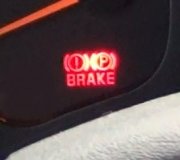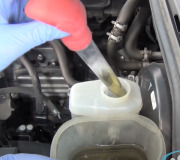Steve W. Is right on the money, but he still didn't go far enough. There is only ONE proper repair. That is to remove every part with rubber in it, flush and dry the steel lines, then install new parts with rubber parts in them. That includes all the rubber flex hoses, front calipers, rear wheel cylinders, master cylinder and reservoir, combination valve or, if you have anti-lock brakes, the hydraulic controller. Trucks and minivans usually use a rear height-sensing proportioning valve. That has rubber o-rings, so it must be replaced too.
The entire hydraulic system is contaminated, and if you overlook any one of those rubber parts, the contamination will leach out of it and recontaminate all the new parts. This is definitely a very expensive repair, and it can send a car to the salvage yard.
Every year I did a demonstration for my students where I put fresh, clean brake fluid into two beakers. I dropped a rear wheel cylinder lip seal into each one, then in one beaker, I added one drop of power steering fluid or engine oil. After one week, the seal in the contaminated fluid had grown about 1/8" in diameter and was very soft and mushy.
Automatic transmission fluid, penetrating oil, axle grease, and any other type of petroleum product will do the same thing. Most mechanics even wash their hands with soap and water before handling rubber brake parts to avoid getting fingerprint grease on them.
If you ignore this, you'll find the front brakes getting real hot and the car won't want to move. The lip seals in the master cylinder are going to grow past the fluid return ports and block them. As the brakes get hot, that heat transfers into the brake fluid which will expand. Since the fluid return ports are blocked by those seals, the expanding fluid will apply the brakes even harder. Eventually the car won't move. The brake pedal will be unusually high and hard. When you remove the cap from the reservoir, the rubber bladder seal under it will flop out and you won't be able to pop it back into place. It will feel slimy and mushy. You generally won't reach the point of losing the brakes because the car won't move.
Wednesday, December 14th, 2016 AT 1:28 PM


